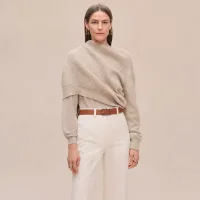You are using an out of date browser. It may not display this or other websites correctly.
You should upgrade or use an alternative browser.
You should upgrade or use an alternative browser.
**Hermes Chat**
- Thread starter mistikat
- Start date
TPF may earn a commission from merchant affiliate
links, including eBay, Amazon, and others
More options
Who Replied?It’s possible that I’m not cool enough for H RTW

The expression on the models faces is like "Really...??"

Reminds me of that pose like a Zara model trend a few years back 😂
I love both, but I think you might use Rose Azalee more. I have a bag in rose confetti (not very far on chart from rose azalee) and I’ve been using it a lot lately, it goes well with so many colors.I don’t know if I’m posting in right place but I’m torn between Rose Azalee and Rose Extreem. Both are C24 PHW and I’m intend to use it for daily activities. What color do you like more?
It’s like they asked AI to generate a unique style and this is what they got. Someone’s getting fired.
The clothes on the hangers are to look cool to Generation Z. Not sure what is the appeal of the face expressions of the models. It seems like a bad movie, and that they are upset at their SOs.Who asked for these product images on the website
View attachment 6168277
View attachment 6168274
View attachment 6168278
You mean you DON'T want to see how your clothes would look like if they were possessed by demons?Who asked for these product images on the website
View attachment 6168277
View attachment 6168274
View attachment 6168278
Reminds me of Margiela’s webpage but H is too sterile for this
Dear all,
I am not sure if this is the correct thread to post. I saw a B25 on a Japanese reseller website. It is a W stamp unused bag but the "screws" have turned yellow. Is this a minor isse? Should I go ahead with the purchase? Thank you.
I am not sure if this is the correct thread to post. I saw a B25 on a Japanese reseller website. It is a W stamp unused bag but the "screws" have turned yellow. Is this a minor isse? Should I go ahead with the purchase? Thank you.
Attachments
Mine was bought in 2017 and it does not have yellow screws.Dear all,
I am not sure if this is the correct thread to post. I saw a B25 on a Japanese reseller website. It is a W stamp unused bag but the "screws" have turned yellow. Is this a minor isse? Should I go ahead with the purchase? Thank you.
sharing this interesting article with a part excerpted below.
“There is a laundry list of caveats behind buying or “investing” in luxury goods that often go untold.
First is that the value of a product is all dependent on the whims of fashion trends, which could change overnight through a celebrity endorsement or viral video. For that reason, it’s entirely unclear if Birkin bags, for example, will be worth any money in a decade—or if you can find anyone to buy it (and believes it’s not a knockoff). And since the condition of a product is paramount, investing likely means you may never even get to use it for yourself—rather just let it sit in a closet.
Moreover, buying new luxury goods is actually much more complicated than one might expect. Instead of just showing up in the store to make a purchase, a buyer often has to cultivate a relationship—leading to most “investors” buying on the resale market anyway.“

 fortune.com
fortune.com
“There is a laundry list of caveats behind buying or “investing” in luxury goods that often go untold.
First is that the value of a product is all dependent on the whims of fashion trends, which could change overnight through a celebrity endorsement or viral video. For that reason, it’s entirely unclear if Birkin bags, for example, will be worth any money in a decade—or if you can find anyone to buy it (and believes it’s not a knockoff). And since the condition of a product is paramount, investing likely means you may never even get to use it for yourself—rather just let it sit in a closet.
Moreover, buying new luxury goods is actually much more complicated than one might expect. Instead of just showing up in the store to make a purchase, a buyer often has to cultivate a relationship—leading to most “investors” buying on the resale market anyway.“

Gen Z women are being sold a risky dream: the realities behind 'investing' in designer bags like the Hermès Birkin
Gen Z is obsessed with the Hermès Birkin thanks to viral TikTok posts promising higher returns from the luxury handbag than the stock market.
We have a close personal friend who just retired as the COO from Rockefeller Capital Management after 25 years. Even he believed that my Hermes SA relationship is one of my luckiest and potentially lucrative friendships. However, I am silly attached to my bags and do not resell because I keep them for my daughters and myself. However, there are a couple of bags that are worth quite a bit more if I ever chose to sell, particularly my Faubourg Tropical and Quelle Idole.sharing this interesting article with a part excerpted below.
“There is a laundry list of caveats behind buying or “investing” in luxury goods that often go untold.
First is that the value of a product is all dependent on the whims of fashion trends, which could change overnight through a celebrity endorsement or viral video. For that reason, it’s entirely unclear if Birkin bags, for example, will be worth any money in a decade—or if you can find anyone to buy it (and believes it’s not a knockoff). And since the condition of a product is paramount, investing likely means you may never even get to use it for yourself—rather just let it sit in a closet.
Moreover, buying new luxury goods is actually much more complicated than one might expect. Instead of just showing up in the store to make a purchase, a buyer often has to cultivate a relationship—leading to most “investors” buying on the resale market anyway.“

Gen Z women are being sold a risky dream: the realities behind 'investing' in designer bags like the Hermès Birkin
Gen Z is obsessed with the Hermès Birkin thanks to viral TikTok posts promising higher returns from the luxury handbag than the stock market.fortune.com
The problem for younger collectors is acquiring bags to resell in the current environment requires so much capital investment prior to obtaining even one bag now. Hermes COUNTS on the “a bag is an investable asset” allure to encourage the purchase of other merchandise that Gen Z’ers would not typically purchase but for the bags. In the end, most of the bags are a terrible, terrible investment. The sunk cost to get a bag is very high. More importantly, the bag may be illiquid. Unless you are VERY savvy and lucky, you may never own THE bag that brings you top dollar.
We have a close personal friend who just retired as the COO from Rockefeller Capital Management after 25 years. Even he believed that my Hermes SA relationship is one of my luckiest and potentially lucrative friendships. However, I am silly attached to my bags and do not resell because I keep them for my daughters and myself. However, there are a couple of bags that are worth quite a bit more if I ever chose to sell, particularly my Faubourg Tropical and Quelle Idole.
The problem for younger collectors is acquiring bags to resell in the current environment requires so much capital investment prior to obtaining even one bag now. Hermes COUNTS on the “a bag is an investable asset” allure to encourage the purchase of other merchandise that Gen Z’ers would not typically purchase but for the bags. In the end, most of the bags are a terrible, terrible investment. The sunk cost to get a bag is very high. More importantly, the bag may be illiquid. Unless you are VERY savvy and lucky, you may never own THE bag that brings you top dollar.
Amazingly well said! My biggest problem when I see those posts online are that they never factor in acquisition cost of the other items they’d never considered buying otherwise. I enjoy shopping at Hermes as a pick-me-up and the bags are a nice addition, the only time I call it an “investment” is when I talk to people who don’t understand it’s just my hobby that I enjoy. I would never sell my bags or look to buy the “best resale investment” bag because I only buy what brings me joy. But I think some of that also stems from the annoyance of relatives calling my first luxury handbag “not an investment piece” (it was a Fendi monster bag).
That being said @haute okole, I’m ready for adoption any time! 🤪
Register on TPF! This sidebar then disappears and there are less ads!










